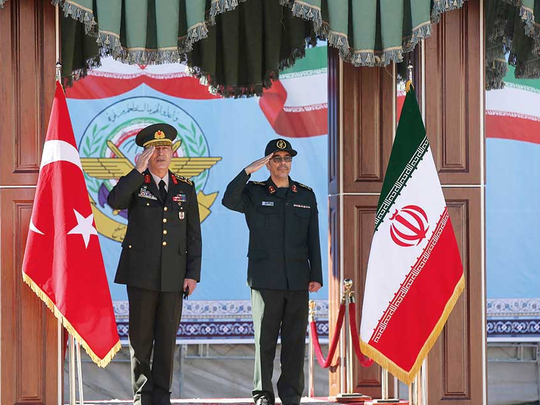
Arbil: Iranian and Iraqi forces conducted joint military exercises on Monday near the border with Iraq’s autonomous Kurdistan region, a Kurdish official said, amid tensions over the Kurds’ independence vote.
“Iraqi and Iranian units began exercises at 11:00 am (0800 GMT) with tanks and infantry only 250 metres (yards) from the border,” Shwan Abu Bakr, the Kurdish customs chief at the Bashmakh border post, told AFP.
“Iraqi forces are dressed in black and there is a large number of Iranian forces,” he said, the black uniforms indicating that the Iraqi forces were from the country’s elite Counter Terrorism Service.
The Iranian military on its website announced joint military exercises with units of the Iraqi army involving armour and artillery units as well as drones and other aviation.
It appeared the manoeuvres were the first joint military exercises between Iran and Iraq since Iran’s 1979 Islamic revolution.
On Friday, the last international flight left Arbil airport as the Baghdad government imposed an air ban on Iraqi Kurdistan in retaliation for the independence vote.
Iraq’s Kurds overwhelmingly backed independence in Monday’s referendum, defying neighbouring countries, which fear the vote could lead to renewed conflict in the region.
Foreign airlines suspended flights to Arbil and Sulaimaniya in the autonomous region, obeying a notice from the government in Baghdad, which controls Iraqi air space.
The Kurdistan Regional Government (KRG), meanwhile, refused to hand over control of its border crossings to the Iraqi government, as demanded by Iraq, Iran and Turkey in retaliation for the independence referendum.
The Iraqi Defence Ministry said it planned to take control of the borders “in coordination” with Iran and Turkey.
The statement did not give more detail or indicate whether Iraqi forces were planning to move toward the external border posts controlled by the KRG from the Iranian and Turkish side.
As the crisis unfolded, Iraq’s top Shiite cleric intervened to oppose the secession of the Kurdistan region, adding to pressure on the Kurds in his first directly political sermon since early last year.
Grand Ayatollah Ali Al Sistani asked the KRG to “return to the constitutional path” in pursuing self-determination for the Kurdish people, a representative said in a sermon on his behalf.
“Any attempt to make secession an accomplished fact will lead to undesired consequences affecting Kurdish citizens,” the sermon said.
Turkey, which has already threatened economic sanctions and a military response to any security challenges posed by the referendum result in neighbouring northern Iraq, has maintained a drumbeat of opposition to the Kurdish vote.
After talks in Ankara with Russian President Vladimir Putin on Thursday, Turkish President Tayyip Erdogan said the referendum was illegitimate and Russia and Turkey agreed that the territorial integrity of Iraq must be preserved.
Turkey and Russia have strong commercial ties with the semi-autonomous Kurdish region in Iraq.
But the vote has alarmed Ankara as it battles a separatist insurgency from its own large Kurdish minority.
The United States, major European countries and nearby Turkey and Iran opposed the referendum as destabilising at a time when all sides are still fighting Daesh.
Both France and the United States said on Friday that Iraq’s territorial integrity must be maintained, but urged Baghdad not to retaliate.
Iraqi Prime Minister Haidar Al Abadi is due to visit Paris on Thursday to discuss the crisis.











